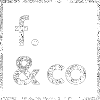–
Play or die. (Game over).
It is difficult to describe the evolution of work over the last twenty years very precisely without resorting to generalities, but the emergence of technological tools and the incessant shift towards immaterial, service-based industries has undoubtedly modified individual workers' approach to workplaces and work practices. The strengthening of economies based on innovative and creative activities has changed how we relate to the organizations that employ us. If we are to constantly transform the products that we make, and increase the proportion of aesthetics and ergonomic thinking that goes into them, we can no longer rely on traditional modes of interaction. We must reconsider not only contractual and educational aspects, but also structure ideological grounds onto which we may interpret and legitimize these novel forms of activity.
One such discourse is notably articulated by so-called creative organizations. Its development is not unrelated to the field of activity in which these structures are active. One of the most successful video games company in the world, Ubisoft has been known to implement managerial practices that are playful in essence. The company, whose products are obviously structured around optimal user experience based on play, has traditionally employed a significant number of designers, artists and programmers that are players themselves. Although this has tended to change with the maturation of the company, Ubisoft remains invested with a managerial ethos of play that draws on the end-product. This relationship between process and output is significant in the video games industry, but reaches beyond into other sectors as well.
In advertising and communications' agencies, the metaphor of play also occupies a central place in the managerial discourse. In these structures, the cycle of work and play is what keeps the creatives interested – a necessary condition to minimize employee turnover and reap the benefits that fall from long term engagement of individuals in the teams and collectives.
<iframe src="//player.vimeo.com/video/24495459" width="500" height="281" webkitallowfullscreen mozallowfullscreen allowfullscreen></iframe>
"Playful management" lifts the organizations at the top of the creative scale to further their disruptive capacities and build discourses that are both convincing and unexpected. In many cases, the customers of communication agencies have expectations that sit much below the realm of possibilities that the creatives foment in their unusual minds. It is only through a managerial approach that fully accepts the playful nature of some interactions that we may realize the full potential of the creative input of core creators.
Play brings about a certain funkiness that can only be lived, not described. What Csikszentmihalyi described in his writings on "flow", moments of absolute creative authenticity are not describable, but only lived. Driving the metaphor of play to consider its childish dimension, playfulness is an attribute that draws energy, perspective, naivety, humanity and instinct, values that are largely transposable to the realm of productive activity.
The "fun" part of work is clearly becoming a necessary condition to retain the best individuals in any given structure – and to generate the best ideas when they do chose to stay. It is not, as some may think, only a fad, but clearly a deep tendency of the creative revolution that draws on needs anchored in each one of us. Even if growth may imperil the ability of organizations to maintain such an unusual ethos instead of relatively more bureaucratic coordination, it remains a source of inspiration that may serve as an ideal-type for those in search of true innovative and creative potential.
As put in words by Aldo Mazza, director of KoSA Communications, there is only one way to integrate this metaphor to everyday life ; "if it starts hurting, play harder". Such lessons could be diffused beyond the realm of art, for the greater benefit of all.
Here's a video interview with Philppe Meunier, SidLee co-founder and Chief Creative Officer, and David Rollert, VP Design at Phéromone, on the topic: http://youtu.be/Ch6JveoIGHA


